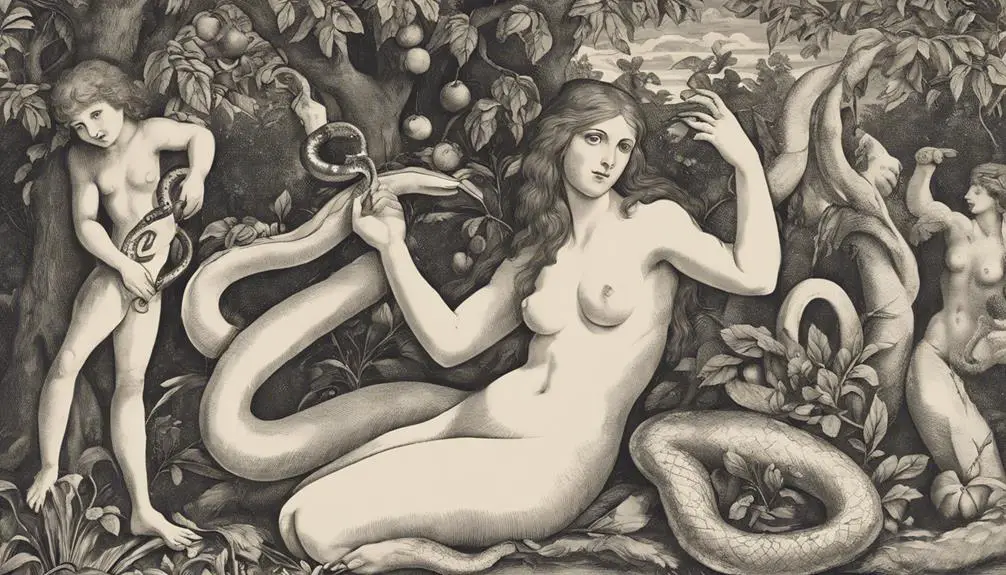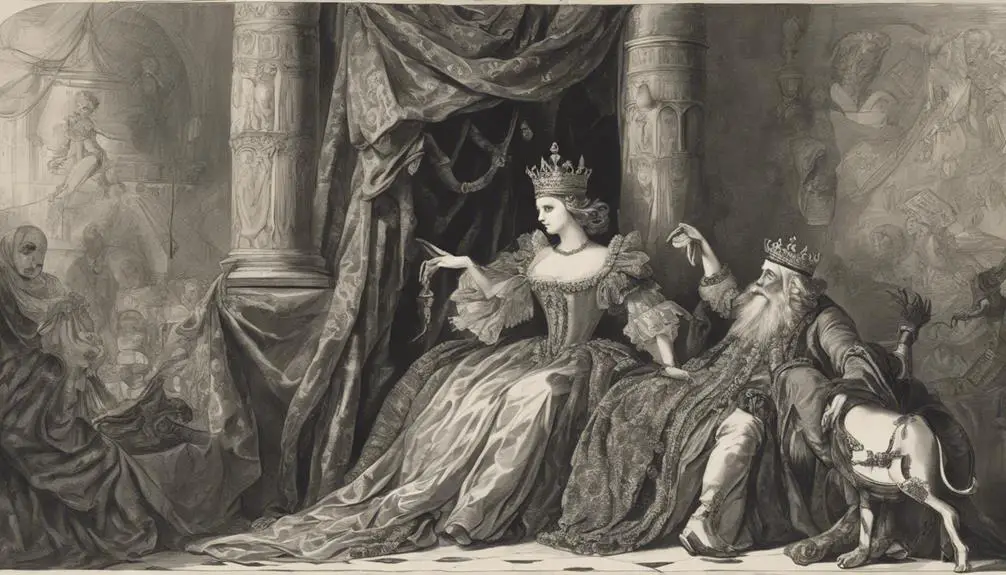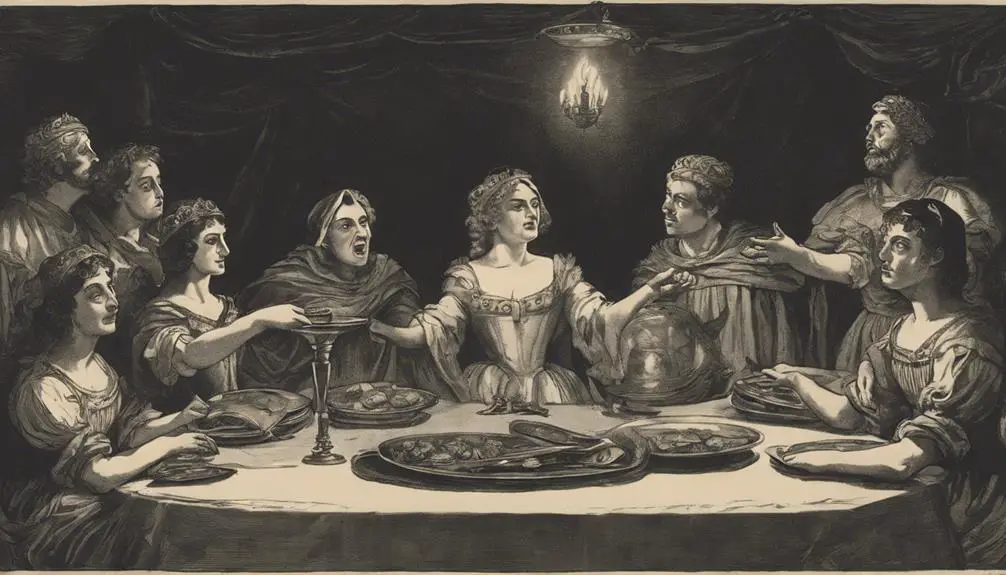Peek into the darker side of biblical motherhood, where sin, manipulation, and betrayal leave lessons in their wake.

Examples of Bad Mothers in the Bible
They say every rose has its thorn, and that holds true even in the Holy Bible.
You're probably familiar with the virtuous mothers like Mary and Sarah, but have you ever considered the mothers who didn't shine so brightly in biblical narratives?
From Eve's original sin to Herodias orchestrating the death of John the Baptist, there's a darker side to motherhood depicted in these ancient texts.
Who are these women, and more importantly, what lessons can we glean from their actions? You might be surprised at what you'll discover.
Key Takeaways
- Disobedience in biblical mothers, such as Eve and Lot's wife, resulted in severe consequences and lasting negative impact on their descendants.
- Jealousy and manipulation, seen in figures like Sarah and Herodias, led to harm, mistrust, and tragic outcomes.
- Personal insecurities and impatience, exemplified by Sarah, caused harm and showcased the repercussions of losing faith in God's promises.
- The negative influence of biblical mothers like Jezebel and Herodias not only affected their immediate family but also had far-reaching effects on larger communities.
Eve's Original Sin

Diving into the earliest pages of the Bible, you'll encounter Eve, whose act of disobeying God is often viewed as the original sin, setting a precedent for poor motherhood in biblical narratives. This marks Eve's rebellion and the onset of temptation's consequences.
Eve's rebellion wasn't just a defiance against divine authority; it was an act of disobedience that had severe repercussions. The act of succumbing to temptation brought about the fall of man and the introduction of sin into the world, forever altering the course of human history. The consequences of this decision were felt not just by Eve, but by her descendants as well, painting a dismal picture of motherhood.
Eve's decision to partake of the forbidden fruit, despite knowing the consequences, can be seen as a lapse in judgement, a moment of weakness under the influence of the serpent. This act of disobedience resulted in a life of hardship and toil, not only for Eve, but also for her progeny. In this sense, Eve's act serves as a stark reminder of the potential repercussions of our actions, not just on ourselves, but on those who come after us. Thus, Eve's narrative sets a troubling precedent for motherhood in the Bible.
Sarah's Treatment of Hagar

Turning the pages further into the Bible, you'll encounter Sarah whose mistreatment of Hagar serves as another example of flawed motherhood. Sarah's jealousy of Hagar, who bore a son to Abraham when Sarah herself couldn't conceive, led to a series of unfortunate events.
Sarah's harsh treatment of Hagar is an intricate blend of personal insecurities and societal pressures. Despite her divine promise of bearing a child, Sarah's impatience and lack of faith led her to force Hagar into a surrogate mother role. However, when Hagar conceives, Sarah's jealousy surfaces and she mistreats Hagar to a point that Hagar flees into the desert.
- Hagar's endurance is noteworthy as she survives the harsh desert and raises her son Ishmael despite the adversity.
- Sarah's jealousy is a manifestation of her insecurities and her inability to trust God's promise.
- The story emphasizes the consequences of taking matters into one's own hands instead of waiting on God's timing.
This biblical account portrays Sarah's flawed motherhood and her unjust actions fueled by jealousy, providing a stark contrast to the virtuous qualities expected of motherhood.
Lot's Wife and Her Disobedience

Venturing further into biblical narratives, you'll come across Lot's wife, whose disobedience provides yet another example of flawed motherhood. Her story unfolds in Genesis 19, where divine instructions are explicitly conveyed to Lot's family as they flee Sodom and Gomorrah. The command was clear-cut: 'Flee for your lives! Don't look back.'
However, Lot's wife, in her rebelliousness, disregarded this divine instruction and looked back. Her disobedience had severe consequences. She was instantly turned into a pillar of salt, a lasting symbol of the repercussions of disobeying God's commands. Her story serves as a stark reminder of the gravity of disobedience and the tragic outcome it can result in.
Lot's wife's disobedience isn't only a personal failing, but also a maternal one. She was a mother, and her actions led to her absence from her children's lives. As a result, her daughters grew up without a mother, which could have impacted their development negatively.
Jezebel's Deceitful Influence

Shifting our focus from Lot's wife, we encounter another biblical figure infamous for her influence as a mother: Jezebel. Her deceitful influence is characterized by her manipulation and influential power.
Jezebel's manipulation is a significant factor in her story. She's often depicted as a puppet master, pulling the strings behind the scenes. Her power was so influential that she even led her husband, King Ahab, down a path of idolatry and wickedness.
Consider the following:
- Jezebel's role in the murder of Naboth, which was a clear demonstration of her manipulative tactics. She organized a false trial, leading to Naboth's execution and the seizure of his vineyard.
- Her persistence in promoting Baal worship in Israel. She maintained an army of 450 prophets of Baal, despite the people's resistance and the divine warnings.
- Her intimidation of the prophet Elijah, showing her relentless pursuit of power and control.
In all these, Jezebel's impact as a mother and a queen had a profoundly negative effect on her family and the nation of Israel. Her story serves as a cautionary tale about the destructive power of deceit and manipulation.
Herodias and the Beheading of John

Moving past Jezebel, we now delve into the story of Herodias, another motherly figure in the Bible whose actions had devastating consequences, notably the beheading of John the Baptist. Herodias' manipulation led to one of the most infamous scenes in biblical history: John's martyrdom.
Herodias, married to Herod Antipas, was rebuked by John for her unlawful marriage. Instead of repenting, she seized an opportunity to silence John forever. Manipulating her daughter, Salome, into dancing for the king, Herodias demanded John's head on a platter as a reward.
Here's a quick breakdown of this tragic event:
Herodias' Actions |
Consequences |
|---|---|
Unlawful Marriage |
Rebuke from John |
Manipulates Salome |
Dance for the King |
Demands John's Head |
John's Martyrdom |
Through her actions, Herodias not only caused the death of a prophet but also set a negative example of motherhood. She used her daughter as a pawn in her revenge scheme, displaying an utter lack of moral integrity. Herodias serves as a stern reminder of the disastrous results that manipulation and unrepentant sin can bring.
Frequently Asked Questions
What Were the Consequences Faced by Eve's Descendants Due to Her Original Sin?"
Due to Eve's original sin, her descendants faced numerous consequences. God's punishment was harsh – childbirth became painful, and humans had to toil for survival. This is the impact of original sin; it introduced suffering and death into the world.
It's a heavy burden, you see, that all humanity carries because of Eve's actions. Every struggle, every pain, traces back to that moment in the Garden of Eden.
How Did Sarah's Treatment of Hagar Impact the Relationship Between Their Respective Children, Isaac and Ishmael?"
Sarah's jealousy towards Hagar led to strife and eventually Hagar's exile. This significantly impacted their children's relationship.
Sarah's actions fostered a hostile environment, causing a rift between Isaac and Ishmael. This feud didn't just stay with them but extended to their descendants, causing a longstanding conflict.
Apart From Turning Into a Pillar of Salt, What Other Impacts Did Lot's Wife's Disobedience Have on Her Family?"
When you consider Lot's wife's disobedience, it's not just about her transformation into a pillar of salt. Salt symbolism here implies her influence wasn't life-giving, but rather destructive. Her actions sparked Lot's regrets, as her lack of faith disrupted their family's unity and trust.
This disobedience also set a poor example for their daughters, contributing to their misguided choices later. Her actions brought about a fractured family dynamic, impacting them for generations.
How Did Jezebel's Deceitful Influence Affect the Reign of Her Husband, King Ahab?"
Jezebel's manipulation greatly contributed to Ahab's downfall.
You see, she used her influence to steer him away from God's commands. This led to Ahab making poor decisions that had lasting negative effects on his reign.
Her deceitful actions tainted Ahab's legacy, ultimately leading to a downfall that wouldn't have happened had he not been swayed by her manipulative tactics.
What Was the Role of Herodias' Daughter in the Beheading of John the Baptist?"
You'll remember Herodias' daughter's role in John the Baptist's beheading. She danced for King Herod, enchanting him to the point he offered her anything she wanted. Under Herodias' manipulation, she asked for John's head on a platter.
Her influence and Herodias' control culminated in this tragic event. It's a powerful example of how deceit and manipulation can lead to disastrous outcomes.
Conclusion
So, you've seen some prime examples of bad mothers in the Bible. Eve's disobedience, Sarah's harshness, Lot's wife's defiance, Jezebel's deceit, and Herodias's manipulative plot serve as cautionary tales.
These stories illustrate the devastating effects of selfishness, disobedience, and lack of compassion. They remind us of the importance of nurturing and kindness in motherhood and the potential consequences of their absence.



Sign up